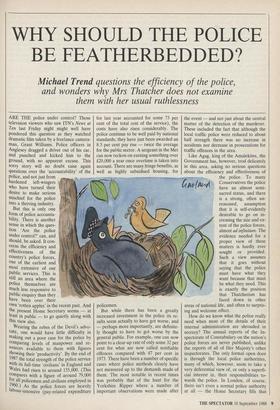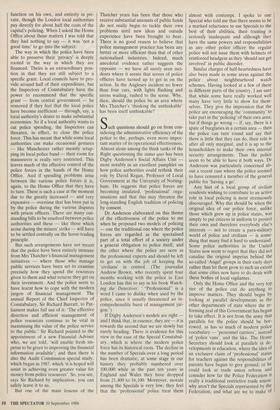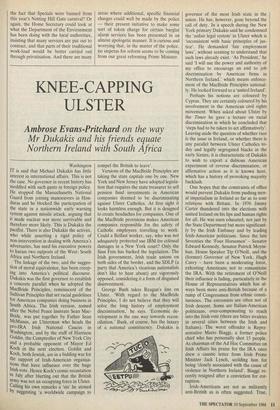WHY SHOULD THE POLICE BE FEATHERBEDDED?
Michael Trend questions the efficiency of the police,
and wonders why Mrs Thatcher does not examine them with her usual ruthlessness
ARE THE police under control? Those television viewers who saw ITN's News at Ten last Friday night might well have pondered this question as they watched dramatic film taken by a freelance camera- man, Grant Williams. Police officers in Anglesey dragged a driver out of his car, and punched and kicked him to the ground, with no apparent excuse. This sorry story will no doubt raise again questions over the 'accountability' of the police, and not just from hardened left-wingers who have turned their desire to make serious mischief for the police into a thriving industry.
Wearing the robes of the Devil's advo- cate, one would have little difficulty in making out a poor case for the police by comparing levels of manpower and re- sources available to them with figures showing their 'productivity'. By the end of 1987 the total strength of the police service with its full-time 'civilians' in England and Wales had risen to around 155,000. (This compares with a figure of around 79,000 for all policemen and civilians employed in 1960.) As the police forces are heavily labour-intensive (pay-related expenditure for last year accounted for some 73 per cent of the total cost of the service), the costs have also risen considerably. The police continue to be well paid by national standards; they have just been awarded an 8.5 per cent pay rise — twice the average for the public sector. A sergeant in the Met can now reckon on earning something over £20,000 a year once overtime is taken into account. There are many fringe benefits, as well as highly subsidised housing, for policemen.
But while there has been a greatly increased investment in the police its re- sults seem actually to have got worse, and — perhaps more importantly, are definite- ly thought to have to got worse by the general public. For example, one can now point to a clear-up rate of only some 32 per cent for what are now called notifiable offences compared with 47 per cent in 1973. There have been a number of specific cases where police methods clearly have not measured up to the demands made of them. The most notable in recent times was probably that of the hunt for the Yorkshire Ripper where a number of important observations were made after the event — and not just about the central matter of the detection of the murderer. These included the fact that although the local traffic police were reduced to about half strength there was no increase in accidents nor decrease in prosecutions for traffic offences in the area.
How do we know what the police really need when most of the details of their internal administration are shrouded in secrecy? The annual reports of the In- spectorate of Constabulary on the nation's police forces are never published, unlike the reports of all of Her Majesty's other inspectorates. The only formal open door is through the local police authorities, many of which, however, seem to take a very deferential view of, or only a superfi- cial interest in, their responsibilities to- wards the police. In London, Of course, there isn't even a normal police authority at all — the Home Secretary fills that function on his own, and entirely in pri- vate, though the London local authorities pay directly for about half the costs of the capital's policing. When I asked the Home Office about these matters I was told that they had nothing to say — it was 'not a good time' to go into the subject.
The way in which the police have been able to preserve their 'privacy' is deeply rooted in the way in which they are financed. Theirs is an extraordinary posi- tion in that they are still subject to a specific grant. Local councils have to pro- vide around half of their expenditure, but the Inspectors of Constabulary have the power to recommend that the specific grant — from central government — be removed if they feel that the local police have become inefficient — through, say, a local authority's desire to make substantial economies. So if a local authority wants to cut police spending, the Inspectors can threaten, in effect, to close the police force. This has meant that while some local authorities can make occasional gestures — like Manchester rather meanly scrap- ping its local police band — their room for manoeuvre is really very restricted. This leaves much of the effective control of the police forces in the hands of the Home Office. And if spending problems arise between the various police forces it is, again, to the Home Office that they have to turn. There is such a case at the moment due to the greatly increased — and very expensive — overtime that has been put in by the police during the various disputes with prison officers. There are many out- standing bills to be resolved between police authorities and these — like those which arose during the miners' strike — will have to be settled centrally on the horse-trading principle.
But such arrangements have not meant that the police have been entirely immune from Mrs Thatcher's financial management initiatives — where those who manage public services have been set to examine precisely how they spend the resources given to them and what returns they get on their investment. And the police seem to have learnt how to cope with the modern jargon of financial management. The annual Report of the Chief Inspector of Constabulary, Sir Richard Barratt, to Par- liament makes full use of it: 'The effective direction and efficient management of police resources continue to be vital in maximising the value of the police service to the public.' Sir Richard pointed to the appointment of a new Financial Adviser who, we are told, 'will enable fresh im- petus to be given to improving the financial information available'; and then there is also the Audit Commission special study, which began in 1987, which 'it is hoped will assist in achieving even greater value for money from police resources'. So, you see, says Sir Richard by implication, you can safely leave it to us.
But one of the main lessons of the Thatcher years has been that those who receive substantial amounts of public funds do not really begin to tackle their own problems until new ideas and outside experience have been brought to bear. There is no good reason to believe that police management practice has been any better or more efficient than that of other nationalised industries. Indeed, much anecdotal evidence rather suggests the opposite — we have all surely seen inci- dents where it seems that scores of police officers have turned up to get in on the action. In the Anglesey incident no fewer than four cars, with lights flashing and sirens wailing, rushed to the scene. Why, then, should the police be an area where Mrs Thatcher's 'thinking the unthinkable' has been itself unthinkable?
Such questions should go on from con- sidering the administrative efficiency of the police to the, perhaps, even more impor- tant matter of its operational effectiveness. Almost alone among the think tanks of the Right questioning the status quo has been Digby Anderson's Social Affairs Unit most notably in an excellent pamphlet on how police authorities could rethink their role by David Regan, Professor of Local Government at the University of Notting- ham. He suggests that police forces are becoming insulated, 'professional' orga- nisations and that this may threaten the long-standing English tradition of policing by consent.
Dr Anderson elaborated on this theme of the effectiveness of the police to me when he proposed two models of policing — one the traditional one where the police forces are regarded as the specialised part of a total effort of a society under a general obligation to police itself, and the other where the police are seen as the professional experts and should be left to get on with the job of keeping the 'civilians' in control. (The journalist Andrew Brown, who recently spent four months working with the police in East London has this to say in his book Watch- ing the Detectives: ' "Professional" is a word I came to dislike when used by the police, since it usually threatened an in- comprehensible burst of management jar- gon.') If Digby Anderson's models are right and I think that, in essence, they are — it is towards the second that we are slowly but surely heading. There is evidence for this view in the case of the Special Constabul- ary, which is where the modern police force has its historical roots. The decline in the number of Specials over a long period has been dramatic; at some stage in our history they probably numbered over 100,000 while in the past ten years in England and Wales they have dropped from 21,400 to 16,100. Moreover, morale among the Specials is very low; they feel that the 'professional' police treat them almost with contempt. I spoke to one Special who told me that there seems to be a marked reluctance to use Specials to the best of their' abilities; their training is seriously inadequate and although they have the same powers and responsibilities as any other police officer the regular police will not issue them with helmets or reinforced headgear as they 'should not get involved' in public disorder.
Similar charges of half-heartedness have also been made in some areas against the police about neighbourhood watch schemes. Having looked at a few of these in different parts of the country, I am sure that while some have really worked well many have very little to show for them- selves. They give the impression that the police are encouraging the 'community' to take part in the 'policing' of their own area; but if things go wrong — if, say, there is a spate of burglaries in a certain area — then the police can turn round and say that there is little that they can do, their role is after all only marginal, and it is up to the householders to make their own internal security arrangements. Thus the police seem to be able to have it both ways. Dr Anderson was particularly concerned ab- out a recent case where the police seemed to have censured a member of the general public for 'having a go'.
Any hint of a local group of civilian residents wishing to contribute to an active role in local policing is most strenuously discouraged. Why this should be when the original idea of our police force, unlike those which grew up in police states, was simply to put citizens in uniform to protect their own and therefore everybody else's interests — not to create a para-military world of police and civilians — is some- thing that many find it hard to understand. Some police authorities in the United States now seem to regret that they did not canalise the original impetus behind the so-called 'Angel' groups in their early days rather than let them grow to such an extent that some cities now have to do deals with these bodies of local vigilantes.
Only the Home Office and the very top tier of the police can do anything to improve matters. They should begin by looking at parallel developments in the other departments of state where the re- forming zeal of this Government has begun to take effect. It is not from the army that parallels for the police should be bor- rowed, as has so much of modern police vocabulary — 'personnel carriers', instead of 'police vans', and the like. The Home Secretary should look at parallels in de- velopments in education, where the idea of an exclusive claim of 'professional' status for teachers against the responsibilities of parents have begun to give ground; or he could look at trade union reform and consider how far the Police Federation is really a traditional restrictive trade union: why aren't the Specials represented by the Federation, and what are we to make of the fact that Specials were banned from this year's Notting Hill Gate carnival? Or again, the Home Secretary could look at what the Department of the Environment has been doing with the local authorities, insisting that many services are put out to contract, and that parts of their traditional work-load would be better carried out through privatisation. And there are many areas where additional, specific financial charges could well be made by the police — their present initiative to make some sort of token charge for certain burglar alarm services has been presented in an almost apologetic manner. It is curious and worrying that, in the matter of the police, no impetus for reform seems to be coming from our great reforming Prime Minister.
























































 Previous page
Previous page